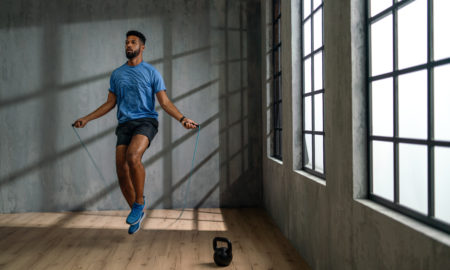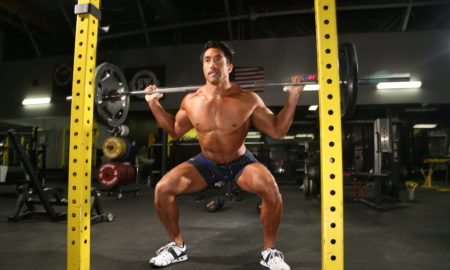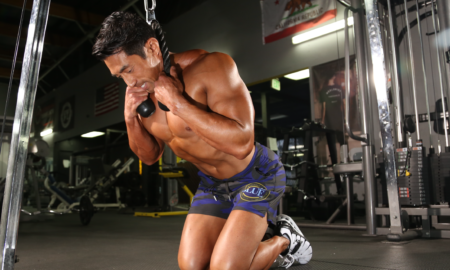


“Now that I’m 40 years old, do I need to stop doing certain exercises or run the risk of getting injured?” This is an often-posed question with a simple answer: “Keep doing the same exercises you were doing when you were 21 years old.”
The hardcore barbell exercises that you did in your youth are actually exactly what you need. Giving up squats, deadlifts, and presses for a strict regimen of fixed-path machines would only hasten any age-related decline. That being said, aging trainees should keep a few things in mind: Recovery capacity is lesser than that of a younger individual, and injury potential is higher. This is mostly a function of two critical factors of neuromuscular recovery: poor sleeping patterns and waning endocrine support (de-creased synthesis of testosterone and growth hormone). To put it plainly, you don’t need to change your workout as you age, but you do need to lengthen the recovery period between training sessions.
When it comes to exercise selection, stick with compound movements that maximally load the musculoskeletal system: squats, deadlifts, overhead presses, bench presses, and pull-ups. These generate the most robust hormonal response serving to rejuvenate the body, protecting it from injury. Remember, your body is a dynamic, adaptive machine. Impose upon it a properly dosed stress (in this case, the trauma of strength training) at an optimal frequency and the body responds. Strength training is similar to medication in that the proper dosage and frequency will generate the desired effect of improved strength and muscularity, improved neuromuscular and cardiovascular efficiency, and augmented bone density. The health-promoting effects of strength training are in-numerable and accessible to men and women alike.
Winning The Injury Game
An injury can set you back months or even longer depend-ing on its severity. To avoid being relegated to spectating, you must realize that you’re not 21 anymore. Is a 405-pound squat a smart goal for an unenhanced 40-plus trainee? Certainly, at age 50, this should not be your goal. Should you attain that 405-pound squat, kudos to you, but poundage should never be your primary focus. Safely per-forming the prescribed exercises while striving to improve your health are much more appropriate goals for the aging lifter. A preoccupation with the number on the bar is a fast track to the local ER. Instead, shoot for longevity, both in and out of the gym. Twice-weekly strength training mixed in with endurance-type work and allowing for active rest will suit most individuals, affording them ample recovery time. (Such a protocol is outlined in the pages of our book, Get Serious, A Neurosurgeon’s Guide to Optimal Health and Fitness.)
There are no gender-specific or age-specific exercises. Only the dosage and frequency of said exercises may need modification as years goes by. The trick is learning to decode the signals your body gives you by establishing a sense of “body mindfulness.” Do you feel overly fatigued in the wake of an exercise session? To the extent you would not even consider a heavy workout on your next scheduled day? Is your resting heart rate elevated by more than 10 percent from baseline levels? Is your sleep altered? These are potential signs of overtraining and equate to muscle catabolism and an increased risk of injury. Over-training symptoms are telling you that you need to back off your intensity. Take a one-week hiatus from training. In fact, this should be done every eight to 12 weeks regardless, because the majority of us are overtraining. Think of it as wisely walking away from a fight. This concept becomes even more paramount as we age.To more closely elaborate on the original question, you do not need to change your selection of exercises in the context of your chronological age. Simply understand that you are less resilient than your younger self and allow for additional recovery time. It is critical to remain injury-free by exercising caution in this regard. More is not better—that’s the attitude of the immature and those who have yet to sustain a serious injury.
by Brett Osborn, DO, FAANS, CSCS, & Jay Campbell
A board-certified Neurosurgeon with a secondary certification in Anti-Aging and Regenerative Medicine, Dr. Osborn combines his 30+ years of training experience with his medical knowledge to give you an easy-to-read, science-based guide to health and longevity. From nutrition and supplements to strength training, Dr. Brett Osborn cuts through the nonsense with his logical approach.
Stop wasting time and money on such quick-fixes. They don’t exist. Assume control of your health and Get Serious!
Check out Dr. Brett Osborne’s digital program Get Serious now.





















You must be logged in to post a comment Login